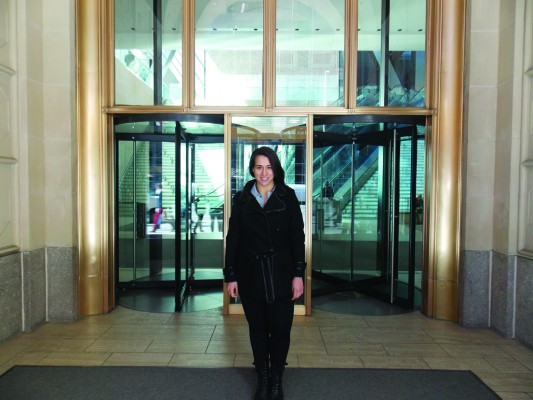In Defense of the Internship
Alexa Pipia, FCLC ’14, poses outside of the Hearst Tower, home to Good Housekeeping magazine. (Maria Fischer/The Observer)
April 18, 2013
Virtually all of us have been lectured that going to college will help us get a job. Fr. McShane may be disappointed to hear this, but my internship at Good Housekeeping has taught me more about working in the magazine industry during the past three months I’ve been there than I have learned in my three years at Fordham. I’m not saying my Fordham education is completely useless, but there’s something about hands-on experience as an intern that makes me feel better-prepared to enter the workforce.

Here’s how I think of it: college is my toolkit and interning is my hands. I can have all the tools in the world, but if I don’t actually pick them up and use them, they are useless. College can help you prepare for the future, but an internship does the actual teaching of how to be a part of the “real world.”
I think the Jesuit ideals with education make it difficult for students at Fordham to enjoy their time in the classroom and intern at the same time. As a communication and media studies major, I am entering a field that requires the type of training an internship gives. Jesuit education is more theory-based, and I’m not sure how questioning Foucault’s theory of space is going to help me in the fashion department, let alone the magazine industry.
Sure, learning theories makes you “smarter,” but how are these theories going to help me when there’s a run-through with the editor-in-chief in 10 minutes and only half of the styles are ready to be pitched? What theories can I use to persuade her to take the pitch?
Working in the fashion department, I traffic clothes and contact PR companies to get credit information. While the title of “fashion department intern” might sound glamorous, I am frequently asked to make copies and fetch water. One time I was even asked to watch the fashion director’s dog while she stepped out for lunch. The hours are long, and even though I’m not getting paid, I have a tendency to work overtime and skip lunch. Am I being exploited? Yes. Do I mind? No.
Although I sometime have to perform menial tasks, my internship taught me how to work hard and how to be—dare I say— a real adult. Even after I earn a higher position in my career, there are going to be days where I need to work overtime or skip lunch. When speaking to my boss about having a career in the magazine industry, I asked her what she thinks would be the best way to get a job in the magazine industry. Her answer? “Intern, intern, intern.”
My boss thinks it is ridiculous that universities charge so much money for their programs when they don’t give an in-depth look as to what it’s like to hold a job. She also says it’s all about acquiring skills and points out that she wouldn’t hire someone unless they had interning experience even if they went to an Ivy League school. In essence, a college diploma is just paper, but interning is actual training.
I can’t speak for other majors, but I feel interning is far more helpful for communication and media studies majors than time spent in the classroom. While I appreciate that the purpose of Fordham’s core curriculum is to help us become well-rounded, I prefer my time spent in the office than in the classroom because I am fully submerged in doing what I love.
Maybe the tasks are menial, but I’m still engaged in the environment. I’ve been thrown into a few photo shoots here and there but even if I am only silently observing, I believe I am learning more by watching the editors at work than when I am sitting down and writing a paper for class. Yes, the studying and the theorizing gets me thinking, but how am I truly able to prove what I learn if it’s not put to action?












